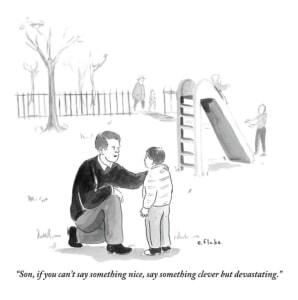Matthew Dicks's Blog, page 56
May 14, 2024
Teacher-student connection
I spend ten minutes talking to my students about the importance of hard work, which I do quite often.
“One of the things I fear most,” I tell the kids, “is discovering that one day, far in the future, you didn’t reach your potential. I want you all to make your dreams come true. I believe in you. But you need to do the work to make it happen.”
Five minutes later, we’re walking in line down the hallway to art class. I’m still discussing the importance of hard work with one of my students. Then I turn to the kid behind us – one of my hardest workers by far – and say, “Remind your friend. What do I fear most?”
Without missing a beat, he says, “Death.”
Like a dagger to my heart.
He must see his words’ effect on my face because he quickly adds, “What? It’s true. You’re terrified of death.”
It’s May.
My students know me so well.

May 13, 2024
Unexpected difficulties derail dinner
A great deal must go wrong to ruin a night out with friends.
Here’s what happened:
We were seated at 7:25 PM on Saturday for our 7:00 PM reservations.
A few minutes later, my wife and our friend ordered glasses of wine. The server suggested a bottle since both women were drinking the same thing, but my wife and friend declined.
Elysha falls asleep after more than one glass.
The server then suggested the bottle a second, third, and fourth time. It was a hard sell. Near the end of the evening, he would remind them to order a bottle next time.
One offer should have been more than enough.
While this was going on, my friend said, “While we’re ordering drinks, I’m going to order some appetizers, too.”
I didn’t understand that he was ordering dinner for the table. We were in a tapas restaurant, and he, his wife, and Elysha were ordering food for the table. This was a problem because his order included beets, Swiss chard, asparagus, chickpeas, and many other things I don’t like.
Beets. Who orders a plate of beets?
In the end, nine plates and several cheeses were ordered. Only three of the plates were palatable to me, though there would soon be just two. And one of them—empanadas—wasn’t something I wanted to eat that night.
The food began arriving almost immediately, though not via our server. Expediters dropped small plates on the table in rapid succession, which is excellent for the timeliness of the food but lousy if you want to order something else (like me) or are wondering where your drink might be (also like me).
I had ordered a Diet Coke amid the other beverage orders. It arrived 30 minutes later. When it finally arrived, the server said, “The soda gun isn’t working, so I’m not sure if the Diet Coke will taste right. Or even if it’s Diet Coke. Can you taste it and let me know? I don’t drink soda, so I wouldn’t know.”
Apparently no one in the restaurant could test the soda. Instead, a patron – me – was made the guinea pig.
One of the few plates of food that I liked was roasted potatoes in a creamy sauce, but the sauce contained mustard. At the beginning of the meal, I had told the server that I was allergic to mustard, but that message apparently failed to land. So I took a bite of potato and knew instantly that I was eating mustard.
So now my stomach was upset for the remainder of the meal (and the evening), making the lack of food just fine.
Our server did not return to the table for quite a while. I planned to order a large plate for myself—a chicken dinner or maybe paella—while everyone else was eating their “appetizers,” but by the time the server finally returned, I had already eaten the mustard, which had ruined my appetite.
Ultimately, I ate two pieces of bread, two meatballs, and half an empanada.
Then, it was time for dessert and redemption: chocolate cake and strawberry cheesecake.
Both were dry and unpalatable. Also, instead of cheesecake, flan was accidentally delivered. The server left it behind for us as he retrieved the correct dessert. Apparently, it was quite tasty.
I don’t like flan. Even the name is dumb.
We left the restaurant as Elysha danced to a Lizzo song playing in the bar area. Elysha is at her finest when she is dancing, even if it’;s just for 20 seconds as she makes her way to the door.
Nothing is more beautiful.
A great deal must go wrong to ruin a night out with friends. This restaurant tried its level best to make that happen.
Happily, I was with Elysha, which makes everything better. We were joined by good friends who offered great conversation. So it was a great night—fun, memorable, and fantastic.
A great deal must go wrong to ruin a night out with our friends.
This night didn’t even come close.

May 12, 2024
The Unstoppable Elysha Dicks
On this Mother’s Day, I thought I’d tell you a remarkable story about my wife, Elysha Dicks.
About ten years ago, Elysha and the kids were having dinner with a friend and his two children at a local restaurant. Clara was four years old at the time, and Charlie was still an infant.
About ten minutes after sitting at the table, a waiter spilled a full glass of wine on Clara, drenching her in red wine. She was not happy in a very four-year-old way.
Elysha picked up Clara and exited the restaurant, leaving infant Charlie with her dinner companion and his two small children.
She brought our daughter to the car to clean her up and quickly determined that Clara’s shirt was not salvageable. She offered Clara one of her brother’s shirts, which happened to be in the car. It would be tight, but it might work.
Clara refused in a very unhappy four-year-old way.
She offered the shirt off her own back.
Clara refused.
She offered to reverse the unsalvageable shirt as a temporary solution.
Clara refused.
As any parent will tell you, forcing any of these shirts onto a raging four-year-old would’ve been impossible.
Elysha needed a shirt of some kind for Clara so that they could, at minimum, re-enter the restaurant to reclaim our baby and return home.
Naturally, her phone was still at the table, so calling and asking our friend to bring Charlie to the car was also not possible.
With no other options, Elysha crossed the street and walked over to the nearest house. She knocked on the door. A man and a woman answered.
Elysha explained the situation and asked the couple if she could borrow a tee shirt for the evening.
Take a moment and let that sink in.
In need of a shirt for my daughter to wear to re-enter a restaurant and reclaim our baby, my wife walked to a nearby house, knocked on a stranger’s door, and requested a tee shirt.
The couple gave her a white tee shirt and sent her on her way.
Clara ultimately refused to wear the newly acquired shirt. Instead, she opted for Elysha to turn her wine-strained shirt inside out.
Elysha and Clara re-entered the restaurant, calmed our now-screaming baby, and completed the meal, which ended up costing them nothing.
She’s incredible. Unstoppable.
Our children are so very lucky to have her as their mom.
I’m so very lucky that such an extraordinary woman is raising my children.
Happy Mother’s Day to all moms in the world, but especially to Clara and Charlie’s mom.

May 11, 2024
Accuracy through repetition
Here’s a new rule I’d like to propose:
If three different people – entirely independent of one another in every way – send you an image claiming it reminds them of you, it’s likely an exceedingly accurate representation of you.
Last week, my friend, Shep, sent this comic to me with the message:
“Thought of you.”
He is the third person to send it to me over the last 18 months, and none of those three people even know one another.
So it must be accurate in both a fortunate and unfortunate way.

May 10, 2024
Don’t worry about who asked who. Ever.
I’ve recently begun writing about friendship – specifically strategies necessary to establish and nurture friendships in your life. My friend, Ann Guo, is researching the subject. Ann wanted to speak to me because she categorized me as “one of the most connected people she knows.”
She has yet to get to know Elysha, who is genuinely the most connected person I know, but she’s not wrong in pointing out that I am blessed with many friends and know many people.
After a long conversation with her and subsequent conversations with a few other friends, I quickly identified strategies I use to cultivate and maintain friendships that may help others.
I think this is important stuff.
The average amount of time Americans spent socializing face to face has fallen 30 percent from 2003 to 2022, and among teenagers, it’s fallen over 45 percent. At the same time, people of all ages are citing increased levels of loneliness and other symptoms of anxiety and depression.
People are having a difficult time connecting to other people, and based on the work of Jonathan Haidt in his must-read book “The Anxious Generation: How the Great Rewiring of Childhood Is Causing an Epidemic of Mental Illness,” the phone owns a large part of the blame.
Rather than spending time with people, we spend time with our screens. Even when we’re in the company of others, many of us are staring at our phones.
Cultivating and maintaining friendships has become more challenging than ever.
One of the strategies I’ve mentioned to Ann and other friends, which seems to have made an impact on them, is simple but important:
Stop worrying about who asked who to do something.
I know so many people who get hung up on the reciprocal nature of friendship. Specifically:
“Why am I always the one making the plans?”
“Why am I the only one initiating the phone call?”
“Why am I the only one keeping this friendship alive?”
I know people who refuse to contact a friend until that friend contacts them first. “I’ve called the last five times. I’m not calling again until she calls me.”
This is all nonsense. Counterproductive hogwash. Self-induced struggle.
The truth is this:
Some people simply possess more capacity and bandwidth than others to initiate, plan, schedule, and organize. If you are one of those people, you should be thrilled about your ability and take full advantage of it. If your friend doesn’t possess the capacity, bandwidth, or even the instinct to initiate contact and make plans but enthusiastically engages in the plans you make, who cares?
The point is to spend quality time in the company of someone you like. It doesn’t matter how that quality time originates.
Are you looking for a friend or a trading partner?
I tend to make most of the tee times for golf. Around Wednesday of each week, I send out a group text to about half a dozen guys asking who would like to play, and within an hour, I have usually assembled a foursome for Sunday.
I’ve never even considered being annoyed or upset about being the only one making these tee times and finding the players. I’m happy to spend two or three hours walking, competing, laughing, and talking to my friends on a Sunday morning.
I also schedule frequent trips to Moth StorySLAMs and other live events and always invite friends to join me. The hours we drive back and forth to New York, Boston, or other locations are almost better than the time spent attending the show.
How often do you get to talk to a friend for four or five hours uninterrupted?
I do this all the time, but I’m almost always the one making these plans, purchasing the tickets, and inviting friends. But I’m never without at least one person joining me for these shows, and the time spent together is precious.
But I’ve never even felt an inkling of anger or disappointment about being upset about being the only one making these plans.
Would it be nice if my friends made more of an effort?
Not really.
As I said, I don’t care how our time spent together originates. Frankly, when I make the plans, I can choose the dates and times that best suit me, so for someone whose calendar would frighten most people, it’s beneficial to be the one planning the future.
This pattern holds true in many other ways:
Dinner with friends
Poker games
Movies
Sporting events
I probably do about 80% of the planning and inviting to these social events, but I’ve never once cared. Why am I one of the most connected people who Ann Guo knows? Why do I always have people with whom to play golf, see shows, attend sporting events, and eat dinner?
Lots of reasons, but one is that I don’t get hung up on who asks who.
Instead, I get hung up on spending as much quality time with family and friends as possible.
That, more than anything, should be the goal.

May 9, 2024
You need to calm down.
When I was interviewed for my first teaching job – the same one I have 25 years later – I did not take the interview terribly seriously. I had already been offered a position in the town where I was living at the grade level I desired. I was about to accept the offer when the call came for the interview:
A teaching job in a neighboring town at a less preferred grade level for only one year. A maternity leave replacement.
Nevertheless, I agreed to the interview with the goal of getting in a little more practice in the event I needed to interview again someday.
So when my future principal asked me how I managed stress and anger as a restaurant manager — the job I had been doing for the previous decade — I told him that when I was especially angry, I would step into the walk-in freezer and throw cases of French fries against the wall until I felt better.
It’s true. That was my primary means of stress relief, though admittedly, I rarely felt stress while managing those restaurants.
I rarely experience stress at all. I’m annoying that way.
That probably would’ve been a much better answer, but again, I wasn’t taking the interview seriously. I had my job already.
But by the time the interview and tour of the school were complete, I knew I had made a terrible mistake. Even though it was a one-year position at a less-than-suitable grade level, I desperately wanted to work in this school for this man. Everything about the school spoke to me.
I couldn’t believe how stupid I had been.
Somehow, despite my less-than-ideal interview, he hired me. I am still grateful today. I met my wife and many of my closest friends at that school. I’ve built a career and made a name for myself inside the walls of that building. My life has been supremely beautiful thanks in part to my teaching career at that school.
Even though throwing cases of frozen French fries against a wall to release stress and anger worked for me back then, it turns out that there may be much better ways to manage anger.
A recent study in Japan has found that writing down your reaction to a negative incident on a piece of paper and then shredding it or scrunching it into a ball and throwing it into the trashcan effectively eliminates anger.
“We expected that our method would suppress anger to some extent,” said researcher Nobuyuki Kawai. “However, we were amazed to find that anger was eliminated almost entirely.”
Researchers believe the results may be related to the phenomenon of “backward magical contagion” — the belief that actions taken on an object associated with a person can affect the individuals themselves.
A voodoo doll of sorts.
In this case, getting rid of the negative physical entity – the piece of paper – caused the original emotion to also disappear.
It’s also a lot easier than tossing around cases of frozen potatoes.
A separate study, based on a review of 154 studies, indicates that when anger strikes, decreasing arousal is far more likely to reduce aggression than venting.
Engaging in activities such as deep breathing, muscle relaxation, yoga, meditation, and mindfulness can help you control or “turn down” your angry feelings and aggressive impulses.
These findings contrast with the belief in venting anger, which has been shown to actually increase anger and aggression. Screaming into your pillow, pounding on a punching bag, or throwing cases of frozen food against a wall actually increases a person’s state of arousal.Playing a sport has proven to be effective at eliminating anger, but researchers now believe that it has more to do with the companionship and teamwork associated with the game than the physical exertion required.So perhaps hurling 35-pound cases of frozen French fries against a freezer wall didn’t work nearly as well as I once thought. It may have felt good at the time, but the release of anger and stress that I was seeking might have been eluding me.Today I almost never experience stress and am rarely angry. After having been arrested, jailed, and tried for a crime I didn’t commit, homeless, tortured at gunpoint, and plagued by decades of PTSD, few things bother me these days. People annoy me and frustrate me, but I rarely become genuinely angry.I’m also a relentless optimist. It’s annoying to some but supremely beneficial in terms of relieving stress and anger.But when I do experience anger or stress, I lean into things that relax my mind:Playing a game with my kids. Riding my bike. Petting the cats Watching a Celtics game. Writing.Mostly, I simply tell myself that the stress and anger I feel now will be irrelevant in an hour, a day, a week, or a month, so why not just allow this moment to already exist in that future?If this won’t be bothering me by Friday, why not treat today like Friday?I also try to address issues of conflict immediately, which often leads to quick resolutions.But if I find myself especially angry at some point, I may try the strategy of writing the source of my anger on a piece of paper and then destroying it:Shredding it. Crumpling it up and tossing it away. Maybe burning it.The best I can do today is a small bag of frozen French fries in my freezer, and I don’t think that will do the trick or make my wife very happy.
May 8, 2024
Shakespeare in “Merrily We Roll Along.” And everything else.
I’ve been reading Shakespeare for almost three decades.
I read Shakespeare to my students—both in novelization form and the original text—and, prior to the pandemic, I also directed a Shakespearean play every year.
But I also read it independently and often. I adore the stories, the language, and the questions Shakespeare poses – old and new – every time I dive in.
Here’s another benefit to reading Shakespeare:
You become a member of a group of people who hear and see Shakespeare everywhere. You are someone encapsulated in a perpetual, ever-expanding inside joke.
Elysha, the kids, and I recently saw the Broadway musical Merrily We Roll Along in New York City. It was a great and tragic story of three people who struggle to remain true to one another and their art in the rising demands for money and fame. The story is told in reverse, beginning with their tragic downfall and then charting back to their first moments together as talented, idealist young people.
It’s heartbreaking.
And as a reader of Shakespeare, I heard the Shakespearean lines included in the show, echoing the tragic falls of Hamlet and Macbeth. While many or most in the theater heard, “A hit! A very palpable hit!” and understood the words in the context of the story, I also heard the voice of Osric declaring that Hamet had scored a point against Laertes in a duel about to go terribly wrong for both men.
This happens all the damn time.
“The Lion King” is a retelling of Hamlet. “West Side Story is a retelling of Romeo and Juliet.” “Ten Things I Hate About You” is a retelling of “The Taming of the Shrew.” And Shakespearean lines abound in everything from The Simpsons to “Hamilton” to Star Trek and “Clueless” to much more.
I’ve heard Shakespeare in commercials, music, and Saturday Night Live.
Shakespeare is everywhere.
Shakespeare also invented about 1,700 words, and though I don’t know most of them, I always smile when I hear a word like bedazzled, swagger, laughable, and fashionable, knowing that they originated in a Shakespearean text.
It’s often assumed that Shakespeare is too challenging to read for pleasure, and many assume that it’s even too difficult to understand, given its 500-year-old language, but none of this is true. And there are ways to make the text more accessible, including reading a novelization first to understand the play better or reading an annotated copy.
Either way, the stories are worth reading and knowing. As a bonus, you, too, can become a member of an exclusive club that hears and understands Shakespeare as it continues to proliferate throughout modern culture.
I suggest you start with “Macbeth.”

May 7, 2024
Atone!
The United Methodist Church overturned its 40-year ban on gay clergy last week, marking a historic shift in the church’s stance on homosexuality.
The church has long been divided into factions over LGBTQ inclusion and even weighed splitting into two separate churches over the issue.
In 1984, the church banned “self-avowed practicing homosexuals” from becoming members of the clergy and later added performing or celebrating same-sex unions to “a list of chargeable offenses that could result in a church trial.”
But no more. Those terrible policies have been expunged. This is excellent news, of course. The arc of history continues to bend toward justice.
But I can’t help but think – and perhaps this is petty of me…
But when you finally abandon your bigotry, you should probably atone for your past bigotry, which should probably begin by admitting you were a bunch of bigots for a long time and probably made the lives of a lot of good, decent people a lot less happy than they could have been.
Right?
Just a simple:
“Hey, everyone! Listen up! It sucks to admit this, but we were bigots for a long, long time. We denied basic rights to people based on our stupid, arrogant beliefs about who should love whom. We were hateful monsters, but we have seen the error of our ways. We are deeply sorry for our immorality and cruelty. You were right, and we were wrong.”
This is admittedly not the Nelson Mandela approach to forgiveness, rooted in the belief that by forgiving your oppressors, you can move beyond the pain and anger of his past and focus on building a better future, but as I acknowledged, my proposal might be coming from a place of pettiness.
But it always annoys me when some hateful bigot fights against the rights of the LGBTQ community for years, only to one day discover that their daughter, son, best friend, or favorite uncle is gay and suddenly see the error of their ways, absent any acknowledgment that they were vile monsters damaging and sometimes destroying the possible happiness of others for a long time before finally changing their mind.
I want some meaningless public accountability, damn it. Is that too much to ask?
Probably.

May 6, 2024
Ringling Bros and Barnum and Bailey Circus is back
Elysha and I took the kids to Ringling Bros. and Barnum and Bailey Circus this weekend.
Much has changed since my first visit years ago. The circus went on hiatus in May of 2017 and only returned to the big top last year after transforming itself in many ways.
First and most noticeable, animals are no longer part of the show. Elephants, tigers, lions, zebras, horses, and the rest have been eliminated because of concerns for the animals’ well-being and the safety of guests and staff.
In their place was a robotic dog named Bailey that was fine but definitely not needed. Had Bailey been destroyed by an oversized hammer as a part of the show, I would’ve cheered.
The animals were not missed.
The humans—more than 75 in all, hailing from more than 18 countries—were more than impressive. We were highly entertained by the acrobatics, the high wire, the trapeze, the unicycles, the human cannonball, and many other incredible displays of physical impossibilities.
The single ringleader has been replaced with a team of three hosts, including one who sings and another who plays the drums at times. All were engaging, multitalented, and hilarious.
The clowns have also changed considerably. Somewhere along the way, traditional clowns became frightening to small children, so the painted faces and red noses have been replaced by a couple of makeup-free middle-aged men who are admittedly quite funny and skilled in juggling and acrobatics, but they look more like a pair of your least favorite uncles than traditional clowns.
Surprisingly, I didn’t mind this change. They were still hilarious.
The set is also pretty spectacular. Lighted video screens, fire, smoke, and constantly shifting elements allow for an engaging visual display.
Our only complaint about the show was the sound quality. The ringleaders weren’t always audible, and we often had to strain to understand what they were saying. As a person obsessed with the sound of his shows, better sound is very doable. I’m unsure if it was the function of the specific venue or an overall problem, but correcting it should be a priority.
Otherwise, the circus is back with a new look and is well worth seeing.

May 5, 2024
Good climate news. Kind of.
I have good news.
I think it’s critical to highlight good news when it happens because the media and humans, in general, tend to focus on the negative whenever possible.
So… good news! For the first time since World War II, a renewable energy resource — hydroelectric back then, solar today — has accounted for more than half of the additional energy generation added to the United States energy grids.
All told, the U.S. added 32.4 gigawatts of solar generation, or 53 percent of new generation added, smashing the 23.6-gigawatt record set in 2021.
Huzzah!
Also a far cry from the days when the Reagan administration gutted the research and development budgets for renewable energy at the then-fledgling U.S. Department of Energy and eliminated tax breaks for the deployment of wind turbines and solar technologies, thus recommitting the nation to reliance on cheap but polluting fossil fuels, often from foreign suppliers.
Reagan also removed the solar panels from the White House roof just six years after Jimmy Carter had them installed, even though they produced clean, efficient, nearly free energy daily.
Perhaps an early example of a Republican’s attempt to “own the libs.”
Or maybe just shortsighted and stupid.
Sadly, it took us another forty years for solar power to exceed more than half of energy generation on the grid.
Imagine how much better the world might be today had we remained committed to Carter’s investments in solar energy development and deployment.
Still, it’s fantastic that more than half of electrical energy is generated today via solar power, which is clean, cheap, and abundant, regardless of what liars and no-nothings might tell you.
Granted, none of this good news matters much, given what is happening in the developing world in terms of emissions, but proof of concept is critical if we ever decide to actually invest in saving the climate for future human generations.
So, a little good news?




